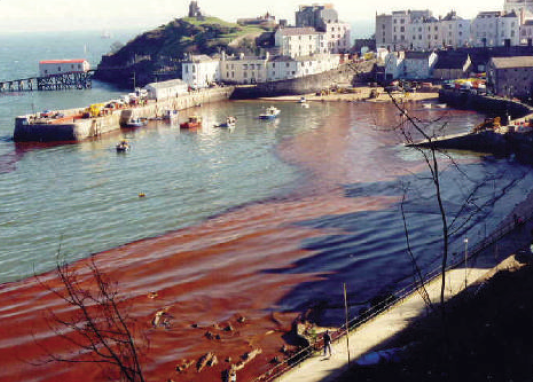News
Sea Empress disaster 20 years on

 IT WAS one of the biggest environmental disasters ever to hit UK shores and now 20 years on from the Sea Empress disaster RSPCA staff are looking back at the role they played in helping to save hundreds of seabirds and mammals.
IT WAS one of the biggest environmental disasters ever to hit UK shores and now 20 years on from the Sea Empress disaster RSPCA staff are looking back at the role they played in helping to save hundreds of seabirds and mammals.
Early on the evening of 15 February, 1996 the Sea Empress, a single hull oil tanker, hit rocks on its way into the Cleddau Estuary and the ship’s cargo of 130,000 tonnes of crude North Sea oil started to spill into the waters off Pembrokeshire.
The RSPCA launched a massive rescue operation in response to the disaster in an effort to save the thousands of oiled and dying seabirds that were so badly affected by the slick.
Scores of volunteers helped open and run a makeshift animal hospital – set up in an old industrial unit – where more than 7,000 dead or oiled birds were taken – while inspectors, drivers and wildlife centre staff experts worked around the clock to nurse, clean and feed as many of the birds back to health as they could.
“The rescue operation took a massive team effort,” said RSPCA chief inspector for the south west Wales inspectorate group, Romain de Kerckhove, who held the same position 20 years ago.
“It quickly became apparent that this incident was of a scale that needed national resources, and a roster was arranged that invited colleagues from all over England and Wales to become involved,” he said.
“Officers would attend, for a limited period, and would work extremely long days, responding to calls from the public, and patrolling beaches to search for victims of the disaster.
“They were accommodated locally, and would be replaced by other colleagues in order to keep the team fresh and strong. Some officers would actually sleep on camp beds at the temporary bird rescue holding/cleaning facility, in order to ensure that there were people on site overseeing the welfare of the birds 24/7.
“This was a rescue that involved teams from across the entire RSPCA, as well as countless volunteers who would work with us, and assist the RSPCA teams both at the cleaning and rehab centre, as well as on the beaches.
“It was hard work, but everyone enjoyed the atmosphere and being involved in such a worthwhile and much needed rescue operation.”
Richard Abbott, who is now an RSPCA chief inspector, was the officer on duty the night the Sea Empress ran aground. “I recall speaking to a Brecon RCC (Brecon Regional Control Centre) tasker who said they had received a call saying a tanker had run aground at Milford Haven and was leaking 30,000 gallons of oil.
I recall thinking, no chance, that’s never going to have happened, not these days with twin hulled tankers. I asked the tasker to ring the Coastguard to double check as I was driving and enroute to an emergency at the time, about 10.30pm ish.
“She rang me back about five minutes later and said to my astonishment that the Coastguard had confirmed the report. I pulled over and rang the chief inspector Romain de Kerckhove at home and started the response.
“I got back in about 1am that night and by 7am I had the call that I was needed to help set up the emergency response centre. A few hours later chief inspector Romain de Kerckhove arrived and took over.
“It was incredibly stressful for those three to four weeks, as we dealt with thousands birds and managed many rescue organisations. It was a steep learning curve.”
RSPCA inspector Rohan Barker attended the day after the incident with chief inspector Romain de Kerckhove.
“We spent two days putting together our response working with several organisations with very few birds coming in during the initial couple of days – but then the onslaught started.
“We worked 15 hour shifts collecting birds, setting up the cleaning station at a local industrial estate building provided by the council.
“Birds were collected by inspectors, animal collection officers and members of the public, brought to the station, initially cleaned and shipped off to RSPCA West Hatch Wildlife Centre by a fleet of vans.”
Dermot Murphy, who is now assistant director of inspectorate at the RSPCA, was one of the convoy of ambulance drivers drafted in from across the country at the time of the disaster to help ship stricken birds from the Pembrokeshire coast to the makeshift hospital.
“I was an RSPCA Ambulance Driver in London then, with just over a year’s service. I was sent to Milford Haven with an Inspector for a week.
“I had never seen anything like it. So many birds covered in oil in a terrible state, they were still being washed up two weeks into the operation. The birds that stuck in my mind were the common scoter, which is a sea duck. There were so many of them, an incredible amount and in such a bad way too.
“We had a busy week and did a range of duties, from collecting food to feed staff, patrolling beaches looking for oiled birds and cutting up food to feed the birds. It was a massive cleaning operation.”
Inside the RSPCA West Hatch Wildlife Centre in Somerset Paul Oaten was one of the team at the ready to take in casualties as they arrived in their droves from the Welsh coastline.
“We took in around 1,200 oiled birds. at the time of the Sea Empress disaster. They were covered in thick oil. Most of the casualties were scoters, and they were very badly affected.
“Luckily we had a lot of volunteers that came in to help with the sheer volume of birds that were coming in through the doors every day. People were happy to come in and wash towels while others spent their days cutting up sprats (fish) for the birds to eat.
“Those that were tasked with washing the birds would be in teams of two. One would hold the birds, the other would clean it using Fairy liquid. They would have a pre-clean where we would try to get as much of the oil off as possible without stressing the birds out. It was so important to get the oil off their plumage, not just because of the feathers but so that we could try to prevent them from ingesting the oil and stop it from burning them too.
“A lot of the birds were emaciated because they could not feed so building their strength back up and increasing their weight was also an important part of the process.”
He added: “Every role was vital to ensure we could keep the steady flow of birds through the cleaning system and the sense of teamwork was immense. That is my overwhelming memory of that time. the teamwork. It was so uplifting. The days were long and it was hard work but we were all working towards a common goal of trying to save these poor stricken birds.”
WWF-UK Head of Marine Policy Dr Lyndsey Dodds said told The Herald: “20 years on from the Sea Empress, Welsh waters are busier than ever but management is still piecemeal.
“The forthcoming Welsh National Marine Plan offers the opportunity to strategically manage activities that can impact upon Wales’s natural assets and should include provisions to ensure that the risks to the most sensitive areas from both accidental and chronic pollution are minimised.”
Crime
Former Wales rugby star admits Christmas Day drink-driving offence

Ex-Ospreys captain was almost twice over limit in Pembroke town centre
Former Wales back row Jonathan Thomas has admitted driving through Pembroke town centre on Christmas Day when he was almost twice over the drink-drive limit.
This week Haverfordwest magistrates heard that Thomas, 43, was stopped by officers as he drove his Mercedes CLA 220 along The Green, Pembroke, at around 5pm on Christmas Day.
“The officers were very concerned at the manner of his driving, as the car was being driven erratically and was swerving to the other side of the road,” said Crown Prosecutor Sian Vaughan.
“When Jonathan Thomas got out of the car, the officers could see that he was having difficulty standing and was unsteady on his feet.”
Subsequent breathalyser tests showed Thomas had 62 mcg of alcohol in his system, the legal limit being 35.
Thomas, who has no previous convictions, pleaded guilty to the drink-drive charge and was represented in court by solicitor Jess Hill.
“He has family in the area and had travelled to spend time with them on Christmas Day,” she told the magistrates. “He’s very remorseful for his actions and hugely regrets his decision that day.”
Jess Hill concluded by saying that Thomas is currently “between jobs and living off his savings”.
Thomas, who gave his address as Main Road, Bredon, was disqualified from driving for a total of 18 months.
“The length of your disqualification reflects the fact that you were more than a little bit over the limit,” commented the presiding magistrates when imposing sentence.
He was fined £120 and ordered to pay £85 costs and a £48 court surcharge.
The former Wales back row left his role as Swansea RFC head coach at the beginning of December 2025 as a result of ongoing health concerns. He was forced to retire from playing in 2015 on medical advice after being diagnosed with epilepsy and is one of the 390 former rugby union players currently taking part in a concussion lawsuit against the sport’s authorities.
“Long-standing issues linked to the head trauma have caused me some concern recently and it has been impossible for me to give the role everything it needs,” he said in a previous interview with the BBC.
His rugby career started out with Pembroke RFC juniors before moving to Swansea RFC, which he captained when he was 19. He then joined the Ospreys where, over a ten-year period, he won four league titles and an Anglo-Welsh Cup. He was the youngest player to captain the Ospreys and, at the time of leaving, was the joint highest appearance holder, together with Andrew Bishop, on 188 appearances.
His international career saw him play for Wales at Under-16, Youth, Under-19, Under-21 and Sevens levels. He made his senior international debut against Australia in 2003, featured at the 2007 Rugby World Cup and was part of two Six Nations Grand Slam-winning sides in 2005 and 2008. Between 2004 and 2011, Thomas was included in every Wales Six Nations squad. In his appearances for Wales, he scored seven tries.
Local Government
Independent panel gives positive verdict on Pembrokeshire County Council

Four-day assessment highlights improvement, leadership and governance
AN INDEPENDENT panel has concluded that Pembrokeshire County Council is meeting its statutory performance requirements and has shown improvement across a number of key areas.
The findings follow a four-day visit in October 2025, when a group of external peers carried out a Panel Performance Assessment (PPA), a process required once every electoral cycle under Welsh Government legislation.
The purpose of the PPA is to provide an independent expert view on how effectively the council is using its functions, how it deploys resources, and whether its governance arrangements are fit for purpose.
The four-member panel was led by Phil Roberts, independent chair and former chief executive of Swansea Council. Other members were Cllr Anthony Hunt, leader of Torfaen Council; Emma Palmer, chief executive of Powys Council; and Andrea Street OBE, representing the public, private and voluntary sectors.
In its final report, the panel concluded that Pembrokeshire County Council is meeting its statutory requirements and commented favourably on many aspects of its work. The authority was described as effective, having responded well to a challenging financial position and demonstrated improvement in a number of key areas.
Among the report’s findings was praise for “a cohesive cabinet, which despite its rainbow coalition arrangements, exercises a model of distributed leadership which is particularly effective”. The panel also highlighted “a committed Senior and Extended Leadership Team who recognised the journey of improvement the council has been on under the Chief Executive’s strong leadership”.
The panel further noted “a broad set of values and behaviours consistently demonstrated across the organisation, from the Senior Leadership Team to frontline staff”, adding that there was “a genuine desire to work in the interests of the communities and residents of the county”.
While the overall assessment was positive, the report also identified areas where further progress could be made. Seven recommendations were set out, covering scrutiny arrangements, corporate capacity, collaborative leadership, economic regeneration capacity, resource prioritisation, communications, and transformation and innovation.
Council leader Jon Harvey welcomed the report, describing the assessment as a constructive experience.
“This was an extremely positive experience for the council, and an opportunity to learn and benefit from the views and perspectives of independent experts from outside the authority,” he said. “We welcome the assurance provided by the panel that we are on the right track, and the feedback which has helped to identify opportunities and areas for improvement.”
Cllr Harvey also thanked panel members for their work, along with officers from the Welsh Local Government Association who supported the assessment process.
“We accept the panel’s findings in full and I am convinced that the action plan we have developed in response to the recommendations will enable us to further strengthen key areas of our work so we can continue to provide quality services to our residents and communities,” he added.
In line with legislation, the council has produced a formal response and action plan setting out how it will address the panel’s recommendations. These will be presented to Cabinet on February 9 and to full council on March 5 for formal approval.
News
Kurtz calls on Labour MPs to back release of Mandelson papers

Opposition motion follows Epstein-linked document disclosures
A SENEDD Member has called on Labour MPs to support a Conservative Opposition Day Motion demanding the release of papers linked to Peter Mandelson’s appointment as the UK Ambassador to the United States.
Samuel Kurtz said the motion follows the publication of new files and photographs involving Lord Mandelson, which were released as part of a United States investigation into the disgraced and convicted child sex offender Jeffrey Epstein.
Speaking out, Mr Kurtz said that during Prime Minister’s Questions, the Prime Minister admitted he was aware of Peter Mandelson’s ongoing relationship with Epstein at the time of his appointment.
“That means the Prime Minister knowingly appointed Peter Mandelson to one of the most important diplomatic roles in government despite his links to Epstein,” he said. “This raises serious questions about the Prime Minister’s judgement.”
Mr Kurtz went on to accuse the Prime Minister of attempting to prevent transparency over the appointment process.
“Now, instead of being open and transparent, the Prime Minister is attempting to block the release of documents relating to Mandelson’s appointment in order to protect his own position,” he said.
He warned that Labour MPs who oppose the motion would share responsibility for withholding information, adding: “If Labour MPs support blocking the release of these papers, they will be complicit in covering up the process and judgement that led the Prime Minister to appoint Peter Mandelson as Ambassador, despite his friendship with Jeffrey Epstein.”
-

 Health6 days ago
Health6 days agoConsultation reveals lack of public trust in health board
-

 News1 day ago
News1 day agoPrincess of Wales visits historic Pembrokeshire woollen mill
-

 Crime5 days ago
Crime5 days agoPembroke man accused of child sex offences sent to Swansea Crown Court
-

 Community6 days ago
Community6 days agoCampaign to ‘save’ River Cleddau hits over 2,200 signatures
-

 Health3 days ago
Health3 days agoDoctor struck off after sexual misconduct findings at Withybush Hospital
-

 News7 days ago
News7 days agoWelsh Conservatives push for reversal of 20mph limit and major road spending
-

 Health7 days ago
Health7 days agoAmbulance called after ‘drop of mouthwash’ swallowed as 999 abuse highlighted
-

 Crime5 days ago
Crime5 days agoManhunt intensifies after woman seriously injured in Carmarthen park stabbing




























